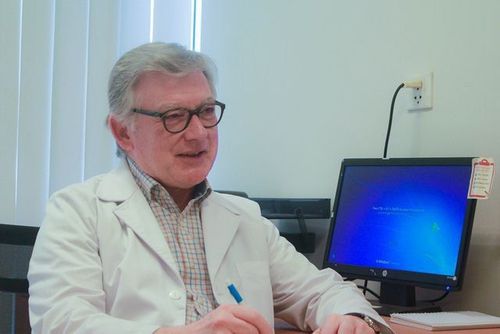This is an automatically translated article.
The article is professionally consulted by Specialist Doctor II Le Thanh Cam - Pediatrician - Pediatrics - Neonatology - Vinmec Danang International General HospitalSudden infant death syndrome (SIDS) is not a common illness or disease. Rather, it is a diagnosis made when an infant under 1 year of age dies suddenly without an immediate cause, however, there are several risk factors that increase the chance of an infant being sudden death.
1. Causes of sudden infant death
Babies with severe defects in the heart, respiratory system or underdeveloped reactive organs are at increased risk of sudden death. Compressed airways when sleeping on the stomach, sleeping in a bed with too many items or a soft bed, and sleeping with parents can also be risk factors for sudden infant death. Infants who died of sudden infant death syndrome had lower-than-normal levels of serotonin in their brains. Serotonin helps regulate breathing, heart rate, and blood pressure during sleep.2. Risk factors for sudden infant death

Lung fungus is the first risk factor for sudden infant death. Lung fungus, which is often misdiagnosed as bacterial or viral bronchitis or bronchial asthma. Premature or very low birth weight. The earlier a baby is born, the higher the risk of sudden infant death. Likewise, the lower the weight, the higher the risk of sudden infant death syndrome. Babies are born when mothers are under the age of 20. Teenage mothers are more likely to have a baby with sudden death than older mothers. Mothers who are not cared for, attentive maternity monitoring; mothers with a history of smoking (it was found that the number of sudden infant deaths increased in the group of mothers who smoked during pregnancy). The family has a large number of children and the birth distance is close. The risk of sudden infant death syndrome increases with each baby. Also, the shorter the time between pregnancies, the higher the risk of having a baby with SIDS. Twins double the risk of sudden infant death (even if the babies weren't born prematurely or with low birth weight). If a baby had sudden infant death syndrome in a previous pregnancy, the risk of sudden infant death in the womb is five times greater. Experiencing life-threatening situations. Babies who have experienced life-threatening situations such as apnea and cyanosis, paleness, weakness and needing emergency resuscitation have a higher risk of sudden infant death. Infants are boys. About 30-50% of boys have a higher risk of dying from sudden infant death syndrome in boys than girls. Several other factors have also been suggested to be associated with the risk of sudden infant death, such as exposure to secondhand smoke (in families with smokers); sleeping on your stomach, not being nourished by breast milk; sudden rise or fall in room temperature; beds, blankets, stuffed animals cause cramped, stuffy; have anemia; In the first 6 months after birth, there is a higher risk, and especially, a higher rate of SIDS has also been found in the group of children who sleep with their parents or with other children for no apparent reason.
3. Prevention of risk factors for sudden infant death

Children should be placed with their heads elevated; keep the room cool, ventilate with a fan; Do not cover the baby's head with a blanket. Ensure adequate nutrition for the baby, preferably with breast milk. Pay special attention to taking care of underweight and preterm infants; children whose mothers are underage, whose mothers are addicted to alcohol, tobacco, or other drug abusers; Children in families with congenital heart rhythm disorders... All newborns must be cared for, carefully monitored, and promptly detected abnormalities in children so that they can be taken care of. to be examined and treated by specialist physicians. As a key area of Vinmec Medical system, Pediatrics Department always brings satisfaction to customers and is highly appreciated by industry experts with:
Gathering a team of leading pediatricians: including leading experts with high professional qualifications (professors, associate professors, doctorates, masters), experienced, worked at major hospitals such as Bach Mai, 108.. Doctors All are well-trained, professional, with a mind - range, understanding young psychology. In addition to domestic pediatric specialists, the Department of Pediatrics also has the participation of foreign experts (Japan, Singapore, Australia, USA) who are always pioneers in applying the latest and most effective treatment regimens. . Comprehensive services: In the field of Pediatrics, Vinmec provides a series of continuous medical examination and treatment services from Newborn to Pediatric and Vaccine,... according to international standards to help parents take care of their baby's health from birth to childhood. from birth to adulthood Specialized techniques: Vinmec has successfully deployed many specialized techniques to make the treatment of difficult diseases in Pediatrics more effective: neurosurgery - skull surgery, stem cell transplantation. blood in cancer treatment. Professional care: In addition to understanding children's psychology, Vinmec also pays special attention to the children's play space, helping them to have fun and get used to the hospital's environment, cooperate in treatment, improve the efficiency of medical treatment.
Please dial HOTLINE for more information or register for an appointment HERE. Download MyVinmec app to make appointments faster and to manage your bookings easily.














